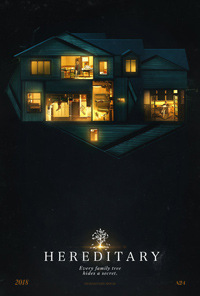Inherit the Wind: Aster Conjures a Horror Classic with Masterful Debut
 For those familiar with director Ari Aster’s body of short films, beginning with his now infamous cult favorite, 2011’s “There’s Something Strange About the Johnsons,” one notes a fascination with familial traumas and rituals which define the parameters of these otherwise familiar universes. It’s perhaps no surprise he turns to horror for his first narrative debut, Hereditary, a searing saga of grief which is rooted in significant emotional truth before it morphs from a fantastic crystallization of foreboding and menace into the supernatural hellfire it promised all along. While such genre elements (involving some sinister diabolical designs launched against an unsuspecting family by their dead matriarch) are not exactly revolutionary, Aster fashions his narrative strokes into an evocative juxtaposition of intergenerational conflicts with increasingly unnerving elements of terror, glued together by a phenomenal performance by Toni Collette as a grief-stricken mother.
For those familiar with director Ari Aster’s body of short films, beginning with his now infamous cult favorite, 2011’s “There’s Something Strange About the Johnsons,” one notes a fascination with familial traumas and rituals which define the parameters of these otherwise familiar universes. It’s perhaps no surprise he turns to horror for his first narrative debut, Hereditary, a searing saga of grief which is rooted in significant emotional truth before it morphs from a fantastic crystallization of foreboding and menace into the supernatural hellfire it promised all along. While such genre elements (involving some sinister diabolical designs launched against an unsuspecting family by their dead matriarch) are not exactly revolutionary, Aster fashions his narrative strokes into an evocative juxtaposition of intergenerational conflicts with increasingly unnerving elements of terror, glued together by a phenomenal performance by Toni Collette as a grief-stricken mother.
The Graham family matriarch, Ellen, has just passed away. While her daughter Annie (Collette) seems unphased by her mother’s death, granddaughter Charlie (Milly Shapiro) seems particularly affected. As Annie navigates her emotional difficulties by attending secretive self-help groups, husband Steve (Gabriel Byrne) attempts to hold the family together. When their teenage son Peter (Alex Wolff) does something irresponsible at a party, tragedy strikes, leaving the family open to vulnerabilities they had no way of predicting or comprehending. When an enigmatic but supportive woman (Ann Dowd) approaches Annie as a potential outlet to share her significant emotional turmoil, the Grahams becomes introduced to something evil and malevolent.
Every frame of Hereditary drips with compounded dread, its sinister score tripping us into a meditative, persuasively layered portrait of dysfunction. Annie’s artistic endeavors, creating miniaturizations which are all seemingly regurgitated approximations of her own experiences, including severe emotional traumas, bolsters the narrative’s suggestive influence of the subconscious. Annie’s somnambulism, for instance, becomes a key to understanding her innate capacity as a mother to comprehend the otherworldly dangers assailing her family—even though they are interpreted as malevolent red herrings in waking life.
An insistent slow burn, Hereditary takes the time to methodically lay out the family dynamic, dropping drastic hints along the way, all of which are usually bookended or repeated motifs throughout the film. Utilizing grief and familial strain as a jumping off point into sheer insanity, Aster’s film revisits a forgotten formula of sincere emotional potency grounded in domestic drama. As such, Heredity recalls something like the high-rise bound Rosemary’s Baby, wherein the foundation itself is an instrument of terror encroaching upon the victimized heroine.
If Heredity inspires gasps from its audiences, it isn’t due to the visceral horror it eventually descends into (although a few choice moments will reverberate uneasily from its disturbing climax). Instead, it’s the incredible human cruelty families have the capability of exacting on one another which makes for Aster’s most pronounced moments of discomfort. Collette, who has never shied away from difficult, problematic women (and across any genre, at that), delivers a commanding, incredibly rich performance as a troubled mother who must navigate a complex array of emotional ranges. Angry and resentful at first, she descends into gut-wrenching howls of rage at a shocking loss (it is, perhaps, one of the film’s most obvious heights of distress, partially due to how Collette’s pronounced posturing is eerily mimicked later). But, more so, her troubled relationship with her oldest child, Peter, is where Collette shines brightest, in twin sequences wherein she professes both love and hatred for her progeny. It’s the type of rare performance which elevates and transcends the narrative beyond any of its familiarities or limitations—and its exactly what makes Hereditary and all its disturbing intentions so powerful.
Hereditary’s supporting cast all also provide sterling work here. While Gabriel Byrne is perhaps the only underwhelming asset, Milly Shapiro’s Charlie, and her handful of early sequences, provides the film with a bit of nightmare fuel. And while Alex Wolff gives a sympathetic turn as a teen used as a diabolical pawn, it’s character actress Ann Dowd as the mysterious Joan who sends Hereditary often into some sublime moments of delirious weirdness (an interaction with Collette in an arts supply store parking lot is extremely well-played for its dueling comic and sinister undertones).
It’s fated characters swallowed up by Grace Yun’s creepy production design, Hereditary is further enhanced by DP Pawel Pogorzelski’s frames, which are somehow as equally unnerving in daytime sequences. Shadowy apparitions terrorize our periphery, force our focus, and train our eyes to invest in its murkiness. The payoff is considerable and allows Hereditary to be one of the best American horror films to come along in decades.
★★★★/☆☆☆☆☆


